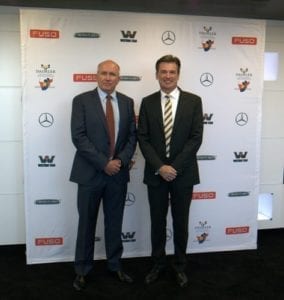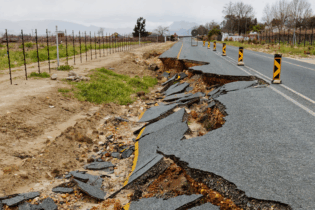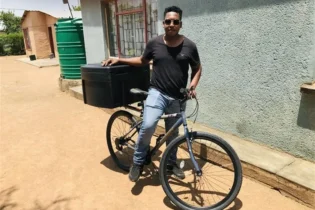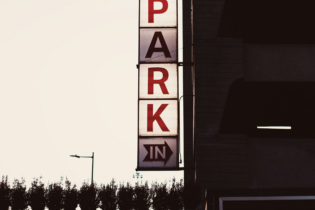Mercedes-Benz South Africa (MBSA), along with its brand divisions Daimler Trucks & Buses and Mercedes-Benz Vans, have celebrated the opening of the Regional Centre Southern Africa (RCSA).
RCSA will be responsible for Daimler’s full commercial vehicles portfolio in the region, from Mercedes-Benz Vans, heavy-duty Mercedes-Benz trucks and buses, as well as trucks and buses from FUSO. RCSA will be in charge of South Africa, Namibia, Botswana, Zimbabwe, Mozambique, Malawi, Zambia, Lesotho and Swaziland. Attending the announcement event last week at the Zwartkops Raceway, Transport World Africa (TWA) fired a few questions at Dr Wolfgang Bernhard, member of the Board of Management of Daimler AG responsible for Daimler Trucks & Buses and Kobus van Zyl, Executive Director: Daimler Trucks & Buses Southern Africa. TWA: Could East London supply vehicles to the Central African region? Dr Bernhard: In Nairobi we have a Completely Knocked Down (CKD) operation for Fuso trucks. Most of the vehicles sold by us in the East Africa region are manufactured in Kenya. The Mercedes vehicles sold in central Africa are supplied from Europe. It depends on the Customs schemes being employed. I know that African governments are making great efforts to ensure that they help each other out in order to have more locally produced vehicles. New products will not be assembled in India and China; they will be assembled in East London. At the end of the day, this is the way to go. We will continue to operate a high standard operation. A number of highly qualified people in East London make high-quality vehicles. We don’t expect a great number of vehicles to be imported Completely Built Up (CBU). That might be the case in the early stages, but at the end of the day, they will be Completely Knocked Down units arriving in East London. We have to explore that, to grow the numbers and see what else we can produce there on top of what we are already producing. We can bring products into a country and have them manufactured there. We will go to great lengths to make sure that any opportunity to produce locally is used, as long as it makes business sense. TWA: Is Africa a better used truck market than a new truck market? Dr Bernhard: Many African countries we now include in the southern region are used truck markets. We cannot only look at new trucks; we will start to look more closely at used trucks. In some places, used trucks comprise 90% of the whole truck market. If you only focus on new trucks you are missing the show. We have trucks coming off lease in South Africa, from North America and from Europe. We know those trucks well, we have all the service records and we know exactly what those truck’s histories are. We might be able to take some of those vehicles and sell them into those used markets. We might be able to put another warranty on them and obtain future customer ID’s. Of course, we can establish relationships with those customers with respect to servicing and parts. This is the greatest anxiety for many of those customers out there. They ask; ‘Do I get the right part? Do I get a skilled repair person who can help me when something breaks? Is there someone out there when something happens? We believe we can do that; we have a good service network; we have mobile service crews that go out in the field and repair trucks when they go off road and cannot be operated. These are important things to our customers. Not only with new trucks but also with used trucks. Used trucks will be important for us in the future. There is a way to connect to those customers and keep them and to grow with them. TWA: What about fuel qualities in these markets? Dr Bernhard: It’s a risk market and there is only so much we can do about it. There are a number of things we can influence. We have a lot of technology available; we serve from Euro 0 to Euro 6 to even Euro 10 in the United States, which are the most stringent emissions standards we have. We have always been ahead of emissions standards and regulations. Right now, South Africa is running at Euro 3 and, whenever the fuel industry commits, we’ll be ahead in terms of the regulatory environment. With respect to emissions, we know that with Euro 4 and Euro 5, we need 50 ppm sulphur content in the diesel. There are already some areas in South Africa where 50ppm diesel is available. We will exploit every opportunity to be early movers rather than latecomers. We believe that we have the right technology in the company. As long as some level of 50ppm diesel fuel is available, we will bring in our technology. TWA: Some might argue that technology is too complicated for Africa… Kobus van Zyl: When it came to Fleetboard, lots of people said: ‘How is Fleetboard tracking and driver diagnosis going to work in Africa’? But actually, we believe it is the most important factor for us in selling new trucks. With our driver skills shortage and lack of training, it is important that we embrace technology. And as you know, Africa is fast becoming one of the most connected continents. I say to Europe, ‘Send the technology’. We are ready to embrace technology with our customers. Dr Bernhard: There is an argument that our technology is too complicated and that nobody can handle it. But just consider the move from manual transmission to automatic transmission, where you take driver error out of the equation and ensure that the machine, the engine, the truck always shifts at the best possible time to save fuel and conserve the long-term reliability of the powertrain. That’s very important. You might say this is too sophisticated. I can assure you we have automatic transmissions running around the world, doing their job and making the powertrain more fuel-efficient and safer. I was astonished in central Africa after meeting customers who said they would like to have a device on their trucks to pinpoint exactly where the vehicles are. They want to know where their trucks are. We are not talking USA, we’re talking about Tanzania. They want to be able to switch the engine off remotely, in case it is stolen. We can do that. We have that in Brazil. They would like to see how the driver is doing, what’s the driving record and review the safety records. They want to review hard braking, going too fast in the turns and how fuel conscious the driver is being. There is also a playful element for drivers that engage in championships to see who the best driver is. All of this can be orchestrated. All these things can be done with Fleetboard. I think this type of technology can play a big role in Africa. We have it and we are rolling it out and there is more to come. We should not be shy of technology, we should not underestimate our customers in their abilities to adopt and learn and absorb this new stuff because this is what this region needs. TWA: Can you engage more with governments in the regions to improve the logistics industry as a whole?Dr Bernhard: When we are asked to, we come forward with advice. We don’t push ourselves onto any government. We are coming forward and educating legislation about the consequences of the decisions we make. We come forward and say: ‘These are the consequences, these are the things you have to balance and this is what we do – not on the stage, behind the stage. It’s about being able to manoeuvre without losing face.
Apart from that, we want to lead by example. We don’t engage with corrupt businesses. We have high standards as a company. We are also active in our communities. If you look at East London and the kind of things we’re doing, we’re going way beyond the education and qualifications that the company would need. We have established an academy in East London where we train people. We believe that not only the big politics, but the small things matter, too. We’re trying to play our part; we engage in charities across the nation and we’ve been an active part of the community. When government’s come to us and say; ‘Would you give us advice? Would you please engage in dialogue and see what can be done? We say yes because we’re experienced and we’re happy to share. Some of the things we’ve seen around the world works but sometimes, even if all the economics are pointing in the right direction, politics can screw it up. There are so many fundamentals in southern Africa that really are great. We’ve seen that many times in many countries, despite the fact that everything is there; politics cannot get it to work and this is what we have to convey. TWA: What should local industries in the listed countries you’ll be serving expect from the new Regional Centre? Kobus van Zyl: The first thing we want to do is make sure the customer experience is at a level that has not been experienced before. This is the biggest differentiator between Daimler Trucks and some of the other manufacturers. The first thing you’ll see is far more visibility of our teams. You’ll find customers commenting more on the improved service and I’m not saying that the service delivered already is necessarily bad, but they have better support now. We have much shorter supply lines, we have the ability to act a lot faster and then you will see investment coming, not necessarily investment in ‘Taj Mahal’ type dealerships. We believe that customers pay for service and uptime. This is where we will, together with our general dealers, make a difference. And there will be new products introduced. We will come in with a number of products, which will be specifically targeted to the specific needs of the country concerned. They will be robust, affordable trucks that are tough. TWA: Will any other countries be added to those already listed? Dr Bernhard: There might be a question around Namibia and Angola, but that’s not the prime centre right now. The most important thing is that, as our customers move up into Zambia, they get seamless quality in terms of service and parts. We offer the same services along the whole lines to make sure our customers who travel far distances have their minds at ease, knowing that they get the same quality for Fuso, Mercedes and Freightliner along the way. TWA: What is the total value of the investment you have made? Kobus van Zyl: We do not see a need for significant infrastructure investment. Our focus area is people; we believe we can leverage the existing teams. One of the benefits is that we have different brands that we represent and that allows us opportunity to grow into these areas with very minimal investment. Dr Bernhard: In this business, brick and mortar is not so important. What’s more important is human capital. Its investment in the qualifications and training of people. It means technical skills, being able to service trucks and buses. Safety training is also important. Used trucks is a whole new business that we need to look at. So we need to provide training so that people are able to find the right truck for the right purpose. There will be investments in human capital – sales people and technicians – to be able to deliver flawless service. TWA: What is Daimler Trucks’ market position in Africa? Dr Bernhard: With Mercedes-Benz, we’re number one in Southern Africa. In these new countries, it is not so clear where you stand because it is a market that is a used truck market. We are very well positioned in the new trucks business. We have to be realistic and see what we can do in order to grow our business beyond what we do on new trucks. This is a place where trucks are coming in from all over the world. As a world-leading manufacturer with all the technology that we have, with the systems that we have, with the IT we have, with the parts distribution centres we have, with the skilled people we have, we have a leg up against any other competitor that is in the marketplace. In terms of product, we are on the offence, not defence. We will grow our product range as we move forward. We have plans to put those vehicles into East London. We don’t know yet what the investment will be, but be sure that it is a good business case for us to do that. Some of the vehicles to be introduced are being tested already, they are in the field. We are not starting from scratch. Response from customers has been great and now we are making the final touches to these products. TWA: What do you make of the Chinese commercial vehicle strategy in Africa? Dr Bernhard: We take all of our competitors very seriously and we have an eye on the Chinese competition. There are a number of sales that are hinged upon infrastructure projects. When they are building a new road, they bring their trucks and they bring their people. There is nothing we can do about that. Apart from that, I believe there is a great opportunity because some of our competitors have a ‘fire and forget’ attitude. They sell the truck and then they are gone. We will not forget our customers, we’re not going to sell a truck and then run away. We will stay with our customers throughout the lifetime of the vehicle. We will be able, in some parts, to be able to finance them, and be able to help with technical problems, furnish parts in time and base the offering on a whole lifetime experience for our customers. That’s the difference. About the Commercial Vehicles Regional CentresThe Regional Centre Southern Africa is the third of six Regional Centres being opened for Daimler’s commercial vehicles business around the world. Last week, the Regional Centre for East, Central, and West Africa started its operations based in Nairobi, Kenya. The first Regional Centre was opened in October 2015 in Dubai as Daimler Commercial Vehicles Middle East North Africa (DCV MENA). Similar bases will follow for South Asia, Southeast Asia and Latin America within the next few months. In the past, Daimler had managed these regions primarily from its group headquarters in Stuttgart. Further decentralisation will continue.







